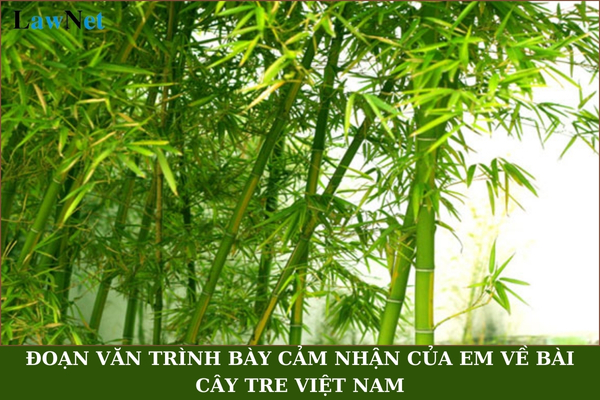What are the brief sample paragraphs on thoughts about the work "Cây tre Việt Nam"? What are the requirements for assessment of 6th-grade students?
What are the brief sample paragraphs on thoughts about the work "Cây tre Việt Nam"?
The work "Cây tre Việt Nam" by author Thep Moi is a piece taught and learned in the 6th-grade Literature curriculum.
The work portrays the image of the bamboo tree as a symbol of resilience, and endurance, and its close connection to the lives of the Vietnamese people.
Below are some brief sample paragraphs on thoughts about the work "Cây tre Việt Nam":
|
Brief sample paragraphs on thoughts about the work "Cây tre Việt Nam" Paragraph 1 |
---
Note: The brief sample paragraphs on thoughts about the work "Cây tre Việt Nam" are for reference only.

What are the brief sample paragraphs on thoughts about the work "Cây tre Việt Nam"? What are the requirements for assessment of 6th-grade students in Vietnam? (Image from the Internet)
What are the requirements for learning results of 6th-grade students for the entire school year to be eligible for grade advancement in Vietnam?
Under point b, clause 1, Article 12 of Circular 22/2021/TT-BGDDT stipulating the conditions for grade advancement of 6th-grade students:
Grade advancement, re-assessment during summer break, and grade retention
1. A student who meets following eligibility may advance to the next grade or be recognized as to have completed lower education program or upper education program:
a) Training results of the entire school year (including re-assessment results after training during summer break according to Article 13 hereof) are Qualified or higher.
b) Learning results of the entire school year (including re-assessment results of all subjects according to Article 14 hereof) is Qualified or higher.
c) Number of days leave does not exceed 45 half-days (calculated according to education plans which is 1 half-day for every day under formal education plan, including permitted leave, unpermitted leave, continuous leave, and intermittent leave).
...
Thus, 6th-grade students whose learning results of the entire school year (including re-assessment results of all subjects according to Article 14 hereof) are Qualified or higher are eligible for grade advancement in Vietnam
What are the requirements for assessment of 6th-grade students in Vietnam?
According to Article 4 of Circular 22/2021/TT-BGDDT, the assessment of 6th-grade students in Vietnam must ensure the following requirements:
- Conduct assessment based on requirements under formal education program.
- Conduct assessment while ensuring accuracy, integrity, fairness, honesty, and objectivity.
- Conduct assessment via multiple methods, forms, techniques, and tools; combine regular assessment and periodic assessment.
- Conduct assessment for student’s improvement; prioritize motivating and encouraging efforts of students in training and learning; do not compare students with one another.

